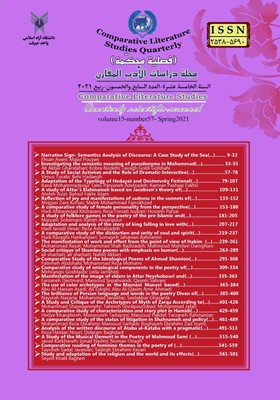A Study of Social Activism and the Role of Dramatic-Interactive Adaptation in the Movie of Ghazal by Masoud Kimiaei and Video Game of Mozahem by Natali Bokchin
Subject Areas : شعرVenus Torabi 1 , Behi Hadaegh 2
1 - Master of English Literature, Department of Foreign Languages and Linguistics, Faculty of Literature and Humanities, Shiraz University
2 - Assistant Professor of English Literature, Department of Foreign Languages and Linguistics, Faculty of Literature and Humanities, Shiraz University
Keywords: رسانه, Media, تبعیض جنسی, gender discrimination, اقتباس بصری, سایبر فمینیسم, Visual Adaptation, Cyber Feminism,
Abstract :
In the present study, two adaptations of Mozahem by Jorge Luis Borges (1966) have been studied. "Ghazal" movie is by Masoud Kimiaei (1975) and the video game "Mozahem" is by Natalie Bookchin, because Borges' story is a narrative of the macho world (patriarchy) and gender discrimination of Latin America. The purpose of this study is to discover and reveal how this gender discrimination is represented in the context of the contextual needs of each of these adaptations. The content of this research mainly emphasizes how social currents can be transformed from an expressive or narrative mode to a dramatic and interactive one. Apart from the method used by each of the adaptations in converting from a written version to a visual version, the focus is on the adaptability of the "Mozahem" short story in the context of Iran (Ghazal Movie) and video game (Mozahem game). Laura Malloy's theory of "masculine gaze" clearly reveals the comprehensive patriarchy of Iran in the movie of Ghazal. In examining the "Mozahem" game, it is tried to show how Natalie Bookchin has used his internet art to promote social activism.
کتابنامه
مقالات
جاویدشاد، مهدی. 1397ش، «ادبیات انگلیسی: از رسالت ایدئولوژیک تا وضعیت پسااستعماری»، فصلنامه مطالعات ادبیات تطبیقی، 12(48)، صص179-204.
نامداری، ابراهیم و آرش محمدی و سید مصطفی احمدپناه. 1398ش، «بررسی تطبیقی فمنیسم در دو رمان «سووشون» و «الحب فی زمن النفط»»، فصلنامه مطالعات ادبیات تطبیقی، 13(51)، صص395-421.
منابع انگلیسی
Bressler, Charles (2007). E. Literary Criticism: An Introduction to Theory and Practice. New Jersey: Pearson.
Bookchin, Natalie (2005). “The Intruder.” Frontiers: A Journal of Women Studies.43-47. 26/1.
Bookchin, Natalie (2012). “The Intruder: web project.” Bookchin.net, 1999. Web 15. February.
Borges, Jorge Luis (2004). The Aleph and Other Stories. Trans. Andrew Hurley. London: Penguin Group.
Daniels, Jessie (2009). . "Rethinking Cyberfeminism(s): Race, Gender, and Embodiment," Women’s Studies Quarterl:103 2/7/1.
De Beauvoir, Simone (1952) . The Second Sex, ed. And trans, Parshley, H.M. New York: Modern Library.
Flanagan, Mary (2002)., Austin Booth, eds. Reload: Rethinking Women + Cyberculture. USA: The MIT Press.
Ghazal. Dir. Masud Kimiai (1975) .Perf. Mohammad Ali Fardin, Faraamarz Gharibian, and Pouri Banai. Iran: Tele Film,. Film.
Haraway, Donna (1985)." A Manifesto for Cyborgs: Science, Technology and Socialist Feminism in the 1980s," Socialist Review.80 101.
Hutcheon, Linda (2006). . A Theory of Adaptation. London: Routledge,. Print.
Jorge Luis Borges (2004). "The Intruder," in The Aleph and Other Stories, 1966, trans. Andrew Hurley. London: Penguin Group, 14-20.
"Machismo(2015) "accessed April 19, , http://www. en.wikipedia.org/wiki/Machismo.
Mulvey, Laura )(1975). "Visual Pleasure and Narrative Cinema," Screen18-6:16/3.
Natalie Bookchin (2005)". The Intruder,” Frontiers: A Journal of Women Studies.47-43: 26/1.
Stam, Robert (2004). Alessandra Raengo, eds. A companion to Literature and Film (New York: Wiley-Blackwel.
The Intruder: (1999) Natalie Bookchin.1999. Video Game.
Tyson, Lois. (2006) Critical Theory Today: A User-Friendly Guide. New Jersey: Routledge.
Vilhaur Rosser, Sue (2005). Through the lenses of Feminist theory: Focus on Women and Information Technology, " Frontiers: A Journal of Women Studies.23-1.26/1.
_||_Bibliography
Javid Shad, Mehdi (2018). "English Literature: From the Ideological Mission to the Postcolonial Situation." Quarterly Journal of Comparative Literature Studies, 12 (48), 179-204.
Namdari, Ebrahim, Mohammadi, Arash and Ahmadpanah, Seyed Mostafa (2019). A Comparative Study of Feminism in the Two Novels "Suvshun" and "Al-Hob Fi Zeman Al-Naft". Quarterly Journal of Comparative Literature Studies, 13 (51), 395-421.
English sources
Bressler, Charles (2007). E. Literary Criticism: An Introduction to Theory and Practice. New Jersey: Pearson.
Bookchin, Natalie (2005). “The Intruder.” Frontiers: A Journal of Women Studies.43-47. 26/1.
Bookchin, Natalie (2012). “The Intruder: web project.” Bookchin.net, 1999. Web 15. February.
Borges, Jorge Luis (2004). The Aleph and Other Stories. Trans. Andrew Hurley. London: Penguin Group.
Daniels, Jessie (2009). . "Rethinking Cyberfeminism(s): Race, Gender, and Embodiment," Women’s Studies Quarterl:103 2/7/1.
De Beauvoir, Simone (1952) . The Second Sex, ed. And trans, Parshley, H.M. New York: Modern Library.
Flanagan, Mary (2002)., Austin Booth, eds. Reload: Rethinking Women + Cyberculture. USA: The MIT Press.
Ghazal. Dir. Masud Kimiai (1975) .Perf. Mohammad Ali Fardin, Faraamarz Gharibian, and Pouri Banai. Iran: Tele Film,. Film.
Haraway, Donna (1985)." A Manifesto for Cyborgs: Science, Technology and Socialist Feminism in the 1980s," Socialist Review.80 101.
Hutcheon, Linda (2006). . A Theory of Adaptation. London: Routledge,. Print.
Jorge Luis Borges (2004). "The Intruder," in The Aleph and Other Stories, 1966, trans. Andrew Hurley. London: Penguin Group, 14-20.
"Machismo(2015) "accessed April 19, , http://www. en.wikipedia.org/wiki/Machismo.
Mulvey, Laura )(1975). "Visual Pleasure and Narrative Cinema," Screen18-6:16/3.
Natalie Bookchin (2005)". The Intruder,” Frontiers: A Journal of Women Studies.47-43: 26/1.
Stam, Robert (2004). Alessandra Raengo, eds. A companion to Literature and Film (New York: Wiley-Blackwel.
The Intruder: (1999) Natalie Bookchin.1999. Video Game.
Tyson, Lois. (2006) Critical Theory Today: A User-Friendly Guide. New Jersey: Routledge.
Vilhaur Rosser, Sue (2005). Through the lenses of Feminist theory: Focus on Women and Information Technology, " Frontiers: A Journal of Women Studies.23-1.26/1.


